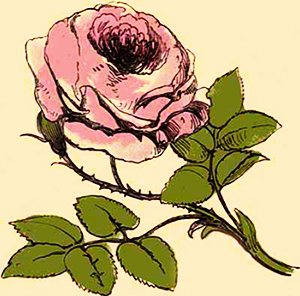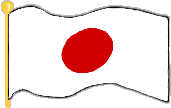野ばら
This is the Japanese version of the German song "Heidenröslein" by Johann Wolfgang von Goethe. Franz Schubert put the poem to music in 1815. Two other German composers also put it to music: Carl Friedrich Zelter and Heinrich Werner.

野ばら
Wild Rose
Traditional Song
Traditional Song
(Japanese)
(English)
童は見たり
野中のばら
清らに咲ける
その色めでつ
あかず眺む
紅匂う
野中のばら
手折りて行かん
野中のばら
手折らば手折れ
思い出ぐさに
君を刺さん
紅匂う
野中のばら
童は折りぬ
野中のばら
手折りてあわれ
清らの色香
永遠にあせぬ
紅匂う
野中のばら
A boy looked at
The wild rose in the field
Chaste, blooming,
He enjoyed looking at the color
He didn't tire of looking,
Deep red, fragrant,
The wild rose in the field.
He wants to break it off and take it away
The wild rose in the field,
If you break me off
Remember,
I'll prick you,
Deep red, fragrant
The wild rose in the field.
The boy broke off
The wild rose in the field,
It's a pity it's broken,
Chaste, beauty,
Forever unfading,
Deep red, fragrant,
The wild rose in the field
Notes
1st Midi Tune: Schubert
2nd Midi Tune: Werner
Pronunciation:
1. 童は(warabe-wa)見たり(mitari)
野中の(nonaka-no) ばら(bara)
清らに(kiyora-ni) 咲ける(sake-ru)
その(sono) 色(iro)めでつ(medetsu)
あかず(aka-zu) 眺む(nagamu)
紅(kurenai) 匂う(niou)
野中の(nonaka-no) ばら(bara)
2. 手折りて(taorite)行かん(yukan)
野中の(nonaka-no) ばら(bara)
手折らば(taoraba) 手折れ(taore)
思い出(omoide) ぐさに(gusani)
君を(kimi-wo) 刺さん(sasan)
紅(kurenai) 匂う(niou)
野中の(nonaka-no) ばら(bara)
3. 童は(warabe-wa) 折りぬ(orinu)
野中の(nonaka-no) ばら(bara)
手折りて(taori-te)あわれ(aware)
清らの(kiyora-no) 色香(iroka)
永遠に(towani) あせぬ(asenu)
紅(kurenai) 匂う(niou)
野中の(nonaka-no) ばら(bara)
For Japanese Students
のばら(Wild Rose)
わらべは(a boy) みたり(looked)
のなかの(in the field or wasteland) ばら(rose)
きよらに(chaste) さける (blooming)
そのいろ(the color) めでつ(praise or enjoy looking)
あかず(not get tired) ながむ(look)
くれない(deep red) におう(fragrance)
のなかの(in the field) ばら(rose)
たおりて(break by hands) ゆかん(bring away)
のなかの(in the wasteland) ばら(rose)
たおらば(If you would break) たおれ(break!)
おもいで(of your memory) ぐさに (article)
きみを(to you) ささん(stick or pierce)
くれない(deep red) におう(fragrance)
のなかの(in the wasteland) ばら(rose)
わらべは(the boy) おりぬ(broke)
のなかの(in the wasteland) ばら(rose)
たおりて(be broken) あわれ(pity)
きよらの(chaste) いろか(color and scent, or beauty)
とわに(forever) あせぬ(not fading)
くれない(deep red) におう(fragrance)
のなかの(in the wasteland) ばら(rose)

Thanks and Acknowledgements
Many thanks to Sadao Mazuka for sharing this song with us
ゲーテ作詞 訳詞 近藤朔風
(Goethe lyrics of a German song as translated to Japanese by Kondo Sakufu.)
Arigato gozaimasu! 
























